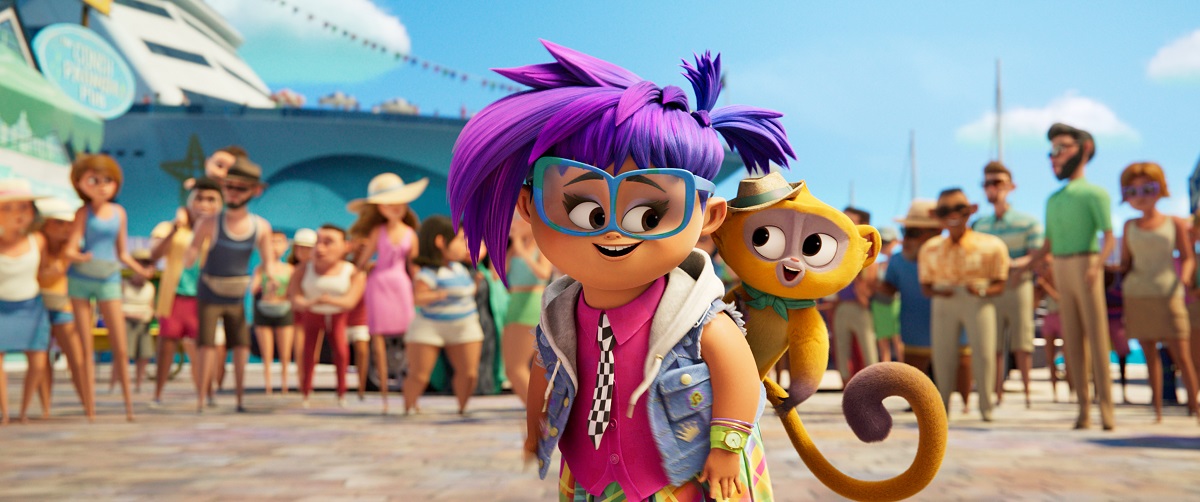Lin-Manuel Miranda re-teams with his “In the Heights” writer Quiara Alegría Hudes and his “Hamilton” music director Alex Lacamoire for “Vivo,” a lively animated musical about a Cuban kinkajou who wants to deliver a message of love and music to Marta, an acclaimed singer (Gloria Estefan), before her final performance in Miami. This involves a journey with an ebulliently impulsive young girl named Gabi who sports spiky purple hair and a short-cut they end up taking through the Everglades.
In interviews, the filmmakers talked about “capturing the spirit of Havana,” with distinctive music from the Caribbean and Florida, and bringing to life a vibrant, confident female character.
LIN-MANUEL MIRANDA: One of the coolest things that I felt right from the get-go was that this truly was a musical about musicians. It’s a really incredible journey about music and friendship and how much music and love unite us. Vivo goes on the journey from Cuba to Key West to the Everglades and Miami with this whole diverse array of characters. What I’m really excited about is the music, authentic, incredible music. It’s about music being able to bridge distances. It’s about how music and love are really sort of the same thing.
ALEX LACAMOIRE: Cuba right now’s not a place that we here in the United States can just take a camera over there and just start filming it and make a movie. It’s a lot more complicated than that. It was great to know that it could be portrayed in animation where your imagination can just go wild and have it look however you want it to look, and still, it feels like Cuba. You see the business in the streets. You see this woman, like, lowering a basket of croquetas from her balcony. I think that this movie is a true love letter to Cuba, and Cuban music, and to what it means. And there’s just a lot in there for me, a lot that really just fills me up, and makes me feel really fulfilled as an artist, as a Cuban-American, as a human being.
The songs reflect so many different genres and influences. What was great is that Lin-Manuel Miranda wanted to honor Cuban music by writing a guaracha song. But he also wanted to a honor Miami by writing a freestyle song. Freestyle is Miami of the ’80s. So, he knew that a song about Miami had to be in that genre. That is his desire, to really pay homage and to marry story with music.

KIRK DEMICCO (co-director): One of the coolest things that I felt right from the get-go was that this truly was a musical about musicians. It was about the music of Cuba, of Miami, of Florida, of the Caribbean, and it had a lot of different styles. And we thought that we could bring in the style of both the classic and the new and the styles of each locality as we went through this road movie, as a journey, a mission, as Vivo travels from Havana to Key West. And one of the things that when we started with us, was the idea of “Who’s he gonna travel with?” And that came up with, “Let’s try to find a really cool new version of an aspirational female character.”
One thing that changed in this storytelling for our entire crew, 300-plus people at Sony, was during the lockdown, we really started going into major production last February. So, from February to February we were working very isolated. We were connected like this through Zoom, and it was the power.
This movie in so many ways became a life raft for a lot of us who, you know, we all came together every day, and this brought joy to us, and we knew we were talking about something that was connecting. The theme was about connecting. It’s about friendship and collaboration, and that’s what we were doing, too. So, I know that it wasn’t something that we had to. And then Lin wrote it right into the song “Keep the Beat,” which is where we all were last summer trying to figure out how to make a big CG musical in thousands of different houses over the internet.
QUIARA ALEGRÍA HUDES (co-writer): When I first came on to “Vivo,” Lin-Manuel had already been developing the characters of Vivo and Andrés. The vibe of Vivo and Andrés was very refined, masterful, virtuosic musicians that lived a humble life but really represented the full accomplishment of a tradition that they performed in La Placita in old Havana. So, you can see on this notecard, I was writing adjectives that encapsulated Vivo. That he’s got panache, he’s graceful, he’s controlled, right?
When Gabi comes into his life, she’s, like: “Improvise!” Well, his version of improvising is still very refined and controlled. Her version of improvising is going buck wild. Like Jackson Pollock, throwing paint at the walls and letting chaos reveal its truth to you. So, we really set up at the beginning, this world of dazzle, swagger, you know, the suave musicians playing together. I wrote this quote on one of my notes: “A classic is a book that has never finished saying what it needs to say.” That’s where the love song comes in. Of course, Kirk said we were writing a musical about musicians, but of course, musicians are humans. And at the core of this journey, what initiates this journey is regret and an incomplete love story that Vivo just feels determined to honor and to complete.
How many times in life do we get to reopen a chapter, re-do, to reconnect with someone we’re estranged from and get another opportunity to close that circle in-in a new way? That’s the world. That’s the world of Act One. But as Kirk said, we wanted to go somewhere really different, and we knew this would become an adventure in delivering that love song. That’s when we started dreaming up the character of Gabi. She’s a party!

The opportunity to take these classy, refined Cuban musicians, and throw them in with this diaspora, Key West, Floridian agent of brilliant chaos known as Gabi was really exciting to me. Kirk and I spoke about “Planes, Trains, and Automobiles” as a model of when you have to take a journey with someone who’s really different from you and really irks you.
It’s the time you put in where you find the commonalities that exist despite your differences, and that you also find freedom in those differences and in those clashes. So, I imbued this character of Gabi with a lot of life and creativity, and spunk, and pizzaz, and wildness. I was really excited to write a wild girl. I feel like a lot of the iconic girl characters that I grew up with in fairytales and stuff were dealing with being good girls, and dealing with being nice.
I wanted Gabi to not be dealing with that. Gabi was just wild, and the world was going to get on board with her or not. And what she was dealing with was some of the ramifications of isolation when you’re a character who-when you’re a person who really does march to the beat of your own drum. Of course, her friendship with Vivo becomes a counter to that isolation. So, on the next slide, you can see our animators just playing with what an expressive, non-poker-faced vibe she has. I love pushing at the stuck window and opening it a little bit farther for what heroes can feel like and look like and be like, dress like, sound like.
When I first started writing Marta, she was already a retired diva, and she had developed quite a salty tongue. But as we realized that this would be her farewell concert, her farewell tour we wanted her to retain that magnificence, that elegance and a deep sense of gratitude as she looks back on her farewell tour on this remarkable musical life she’s lived.
It was really thrilling for Gloria Estefan to actually voice this magnificent diva of Marta. And I really love how in this movie the journey is initiated by an old-fashioned love letter. But then Gabi’s navigating them and completing the song on her smart phone apps. So, I like incorporating all of those old and new modes of communication in this.
JUAN DE MARCOS (Cuban singer Andrés): “Vivo” captures the spirit of Havana, the spirit of my nation, with characters that really represent Cuba. You know, music is a universal language, the most universal language. And even when we were not able to communicate, speaking properly, we were able to play music. We danced and played music.
GLORIA ESTEFAN: “Vivo” is a love letter to “mi tierra,” Cuba. It’s an exhilarating story about gathering courage, finding family, and knowing that music can be transformative.












